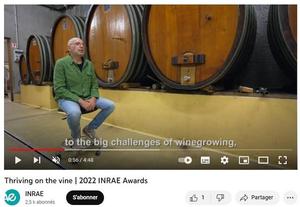
Resistant vine team scoops award
A team working on resistant vines at France’s National Research Institute for Agriculture, Food and Environment (INRAE) has received the Science with an Impact award at the organisation’s annual Lauriers prizes, in which winners are selected by an international jury.
The award marks more than 20 years of work by agricultural scientists, geneticists, pathologists, and oenologists from research units in some of France’s best-known winegrowing regions (Bordeaux, Colmar and Montpellier). Drawing on work that first began in the 1970s, the team has focused on resistance to downy and powdery mildew in particular, seeking to create varieties that enable significant reductions in pesticide use to be made while continuing to produce quality wines.
One measure of their success is the fact that nine red and white grape varieties resistant to downy and powdery mildew are now listed in France’s official varietal catalogue. “Such innovations will inform public policies and stand to greatly benefit the environment, public health, and the economy,” reports the INRAE website.
INRAE’s ResDur grapevine breeding programme was launched early this century, with researchers “mixing and matching several pathogen-specific resistance factors and sources of resistance within individual grape varieties.”
Work first began on resistant lineages in the 1970s and this early work is now being exploited in several different directions. “One axis is identifying and characterising the genetic factors that confer resistance to both mildews,” explains the INRA website. “Another is developing genetic markers for recognising individuals that carry such factors during the seedling stage.
“Indeed, the first phase of breeding focuses on selecting candidate varieties, which means researchers must have marker-based tools to sort through the populations produced by genetic crosses. The team is also creating bioassays for identifying resistance factors, designing new research facilities (e.g., greenhouses, growth chambers) that will facilitate its plant analyses, and further describing the genetic diversity of the pathogens that cause downy and powdery mildew.”
The team’s work forms the basis for intermediate and final breeding of candidate varieties under production conditions, explains the website. INRAE experimental units conduct the intermediate breeding phase and the team’s regional partners perform the final breeding phase, under the leadership of the French Wine and Vine Institute (IFV).
“During each phase, researchers evaluate grape and wine quality as well as resistance to disease (e.g., downy mildew, powdery mildew, and others) and pests,” adds the website. “Then, the scientists seek to register the top candidates in the French variety catalogue; acceptance allows commercialisation.”
For more information:
Last update: 24/05/2023 - ENDURE © 2009 - Contact ENDURE - Disclaimer
